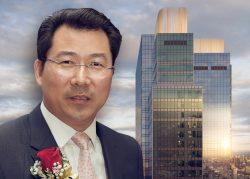Apartments in Skyline Tower offer commanding views of Long Island City and the Manhattan skyline, attractive amenities and the prestige of being in Queens’ tallest building. But 40 percent of them are missing something important: buyers.
Four years after sales began at Chris Jiashu Xu’s ambitious condominium, only 509 of its 802 units had been sold as of Aug. 18, according to data compiled by Patrick Smith, an independent real estate consultant and Long Island City-based agent affiliated with the Corcoran Group.
The building’s most expensive units are priced above $3 million, but no sales of the 36 penthouses have closed and just seven of the sold apartments have three or more bedrooms. Buyers have also closed on 54 studios (which start at $600,000), 208 one-bedrooms and 240 two-bedrooms.
Still, Xu is not panicking. Quite the opposite, in fact: He recently increased the price of some penthouses.
Streeteasy listings show he has marked up PH203 by 18 percent, PH101 by 13 percent and PH202 by 17 percent. That might seem counterintuitive, but Eddie Shapiro, whose brokerage Nest Seekers International is marketing Skyline’s penthouses along with portions of the lower levels, notes that some of the upper-floor units are in contract.
Xu purchased the site, 3 Court Square, from Citigroup in July 2015 for $143 million. Three years later he scored a $502 million construction loan from a group of banks including JPMorgan Chase in a deal brokered by Meridian Capital Group. Xu’s partners on the project include FSA Capital’s Brian Pun, Hong Kong developer Risland U.S. Holdings LLC and Henry Yeung.
The 67-story tower is aiming for a sellout of $1.09 billion, according to filings with the attorney general’s office. It’s the first condo in Queens to try for a billion-dollar sellout.
The building has had its ups and downs since sales got underway in 2018. A high point came in November of that year when Amazon announced that it would open an East Coast headquarters in Long Island City and staff it with 25,000 well-paid employees.
A low point came the following Valentine’s Day, when Amazon abruptly canceled the project in the face of opposition by Sen. Michael Gianaris, Rep. Alexandria Ocasio-Cortez and others.
Some 22 percent of Skyline Tower’s sales came in that three-month period. But Modern Spaces CEO Eric Benaim, whose brokerage has been selling the project since the start, said Amazon’s pull-out didn’t necessarily damage it, because for many buyers the saga put Long Island City on the map.
“People thought, ‘Hey, you know what, it was good for Amazon, then maybe I should check it out,’” he said.
A year after the retail behemoth bailed out, Covid arrived, triggering a terrible stretch for Skyline Tower. Contract signings slowed to a mere 35 in 2020 before bouncing back to 185 last year.
Read more



To be sure, 2020 was a slow year for new development sales in the city. Contracts reported were down 24 percent in Queens and 28 percent in the city as a whole, according to Marketproof. Last year they were up 48 percent and 93 percent, respectively.
Skyline has attracted individual investors more than its Long Island City counterparts have, as 21 percent of buyers offered their unit for rent within six months of closing, according to data from Smith. Only 9 percent of other buyers in the neighborhood last year did.
As would be expected, given the high percentage of investors, Skyline buyers have also been less likely to finance their purchases. Cash buyers have accounted for 27 percent of sales at Skyline, compared with 17 percent last year in the rest of Long Island City, according to Smith.
Although Skyline is unmatched in Long Island City in terms of height, it has plenty of competition. Luxury developments in the area include RockRose’s rental portfolio, Tishman Speyer’s Jackson Park, the Wolkoffs’ 5Pointz LIC and TF Cornerstone buildings. Ron Zeff’s Carmel Partners paid $200 million in March for a site adjacent to Skyline and could build more than 900 apartments there.
Condo and rental developers who bet on Long Island City — a former industrial neighborhood still dotted with manufacturing sites — were counting on its evolving into a residential area. That has largely happened. Target, Trader Joe’s and a Jacx & Co food hall are among the retailers to have moved in, and pedestrians in the area can find themselves dodging baby strollers.
Benaim continues to be bullish on Skyline. He said he expects the project to sell out by the first quarter of 2023. But to do so, it would need to triple or quadruple Modern Spaces’ current pace of 10 to 15 sales per month, which seems unlikely. Benaim said his brokerage had been orchestrating 20 to 30 deals monthly before economic factors, such as interest rates, took a toll.
It is unclear what benchmarks the building must achieve to keep its lenders at bay, but the hike in penthouse prices suggests Xu is not thinking about offering discounts. Shapiro, for his part, said a fire sale is not on the table.
“We’re slightly testing and slightly achieving a whole new price point and benchmark for Queens and for Long Island City. And the developer is patient, strategic,” the Nest Seekers CEO said. “There’s no rush, there’s no pressure. There’s a tremendous amount of equity behind the project, so there’s no stress into just getting it over with.”
